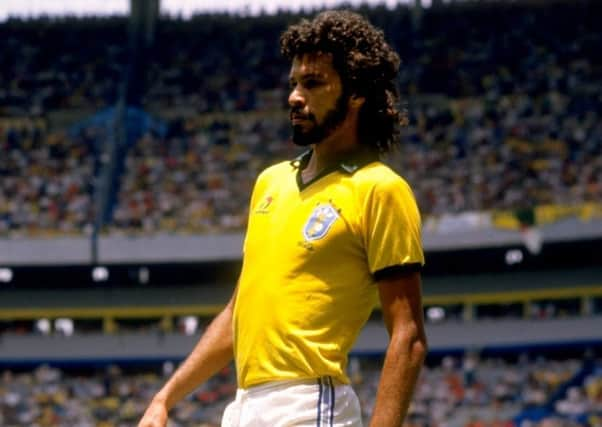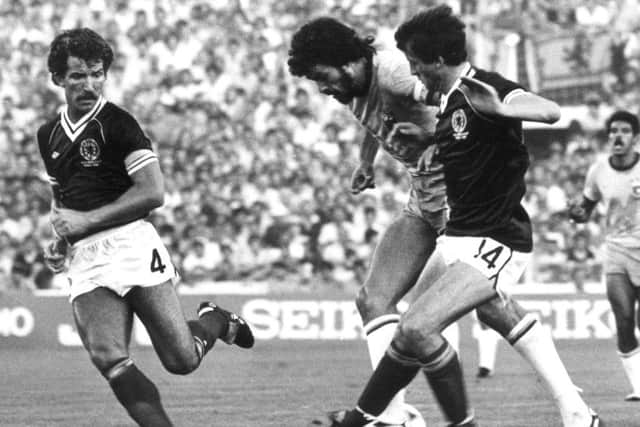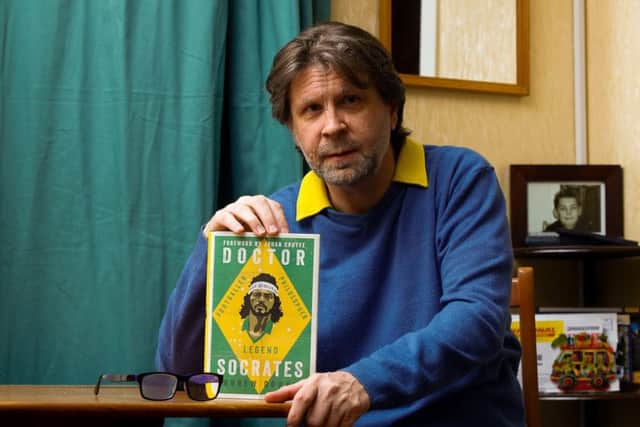Book sheds fresh light on Brazil's football genius Socrates


It would be too contrived to say that we bonded over the consolation of Scotland’s conquerors being a more prosaic incarnation of the Canarinho than those from the two previous tournaments led by the majestic Socrates. It would also be a lie.
On a tram taking us to the Colombia-Cameroon Round of 16 game, Downie recalls now, I’m supposed to have bragged to the locals that imperious Italy goalie Dino Zoff once had to pick the ball out of the net five times while playing for Napoli against Hibernian. Now readers, does that really sound like me?
Advertisement
Hide AdAdvertisement
Hide AdOne thing I do remember is Downie’s attire: a Hibs shirt and kilt for the gig of playing keepy-uppy with oranges for beer money next to a cardboard sign reading “Maradona is God” (Diego was Napoli’s hero at the time). Though he didn’t know this then, the former estimator with Ferranti in Edinburgh was embarking on a journey which would lead to him becoming Socrates’ biographer.


Doctor Socrates is his book and, perhaps utilising the skills he displayed in the Bay of Naples, Downie has done a grand job of juggling all the different facets of the captain of the greatest Brazil team never to win the World Cup (’82 version in Spain). Socrates was also a doctor, a political activist and a playwright. And there was more. Challenged by an Italian press unimpressed by his somewhat less than monk-like lifestyle during a brief, unhappy spell at Fiorentina, he fired off one of the great football quotes with impunity: “I smoke, I drink, I think.”
Actually, the great Socrates quotes would make a book in themselves. When Paolo Rossi and Italy mugged his buttercup-yellow entertainers in ’82, he opined that the defeat had been “like achieving the conquest of the most beautiful woman in the world but then being unable to do what matters with her”. ’82, of course was the World Cup of David Narey’s toepoke, more of which later.
I suggest to Downie, pictured left, domiciled in Brazil since 1999, back in Edinburgh to visit his parents, celebrate his 50th birthday and see Hibs beat Hearts, that Socrates was the last great Brazilian. After that – the three Rs (Ronaldo, Ronaldinho, Rivaldo) excepted – didn’t Brazil become less lovely and more corporate, less based in Rio de Janeiro and more permanently touring the globe at Nike’s direction?
Downie, smiling, starts out loyal to his adopted land. “Some Brazilians would call this entre safras – between harvests,” he says. “After lots of great players there is suddenly a dearth. The ’82 team had the midfield of Socrates, Zico, Falcao and Cerezo. Before ’82, Brazil were exotic. Their players weren’t in Europe and we only saw the team once every four years. Then globalisation happened and everyone became less exotic. You could argue, and Socrates said this, that ’82 was the last great World Cup because it was Brazil’s attackers against Italy’s defenders and the defenders won. That changed football. ’82 was, I think, the last glamorous World Cup. Brazil made sweating look cool.”


Tall (especially for a midfielder), languid and bearded, Socrates looked different at our first glimpse, ghosting beyond three Soviet toilers to crack home a beauty – was he always a man who stood apart? “Right from the start,” confirms Downie. “He was studying to be a doctor. Then his father convinced him he could be a footballer first and practise medicine later, whereas the other way round would have been impossible.
“Tostao from the 1970 side became a doctor post-football but Socrates also smoked like Gerson from that team. Forty cigarettes a day at his peak. He’d run straight to the loos at half-time and blow his smoke out the window.” He didn’t sprint if he could help it, telling Fiorentina’s trainers: “Why do I have to run up hills? I want to run with the ball.” Earlier, at his first Brazilian club Botafogo, while studying for his degree he won the right to train on his own at nights. “But sometimes he’d just do one lap of the track then meet his mates for beers,” says Downie.
There really hasn’t been another footballer like this romantic rebel. “To get close you have to take bits from different players,” adds our author. “In Scotland that might be Billy McNeill’s leadership, Pat Nevin’s intellectualism… and Frank McAvennie’s fondness for the booze and the birds!” Socrates was married four times – five if you count the mother of his son Fidel, named after Castro, his hero, who at the last minute couldn’t find her birth certificate. Socrates described the delicious patterns created by the ’82 team as “organised chaos”. The rest of his life was often just chaos.
Advertisement
Hide AdAdvertisement
Hide AdWhen a footballer gets political it’s unusual – and in Britain at least, viz Gary Lineker’s tweets in support of refugees, he is often viewed with scorn. In Brazil you cannot underestimate the importance of Socrates to the country’s struggle for democracy. He helped establish Corinthians Democracy, named after his second Brazilian club, where everyone from the chairman to the kitman got a vote. “The issues would be when to train and for how long,” adds Downie, “and whether the bus returning from away games should stop for a toilet break! The rest of the country, which had been living under a military dictatorship for two generations, was amazed and inspired by that.”


The story of Brazil’s emeritus professor of midfield nonchalance is a remarkable one and Downie’s isn’t bad either. After bumming round Italia 90 he decided to follow his dream of moving to Rio. In Mexico City he met two journalists at a party who, when he told them he’d always fancied their line of work, told him to report to the office the next day. “That wouldn’t happen now,” he laughs.
Currently working for the Reuters agency, he was initially given the job of translating a book Socrates had written when the legend, who died in 2011, was still alive. “It was a mixture of memoir, philosophy and cultural/historical essays but to my mind there wasn’t enough football. He agreed but he was so disorganised. He disappeared for a whole year and then it was too late.”
Downie filled in the blanks himself with the help of others from that rich harvest. “I found out that Junior drank in the same Copacabana bar every Friday night. And look, here’s Zico’s number on my speed-dial.”
Sadly for him Downie never actually met Socrates. He should have been back in Edinburgh in 2004, I say, when his hero staged a skills camp at a Portobello primary school and exclusively revealed to me that the toepoke performed by David Narey in ’82 was much-valued in Brazil and even had its own name – “To hit with the toe is bico, a classic play.”


Downie’s favourite Socrates yarn comes from the moments after Scotland had been whipped 4-1 in Seville. “He had a good game but the highlight was yet to come,” Downie writes. Selected for an anti-doping test but severely dehydrated, he was going to need a drink or three first. Socrates recalled: “When the fridge was opened I tried to hide my smile. It was filled with all kinds of drinks. It was beautiful! I drank all the beer and then I moved on to champagne. Nothing. Wine, nothing. It was only three hours later that they got their sample.”